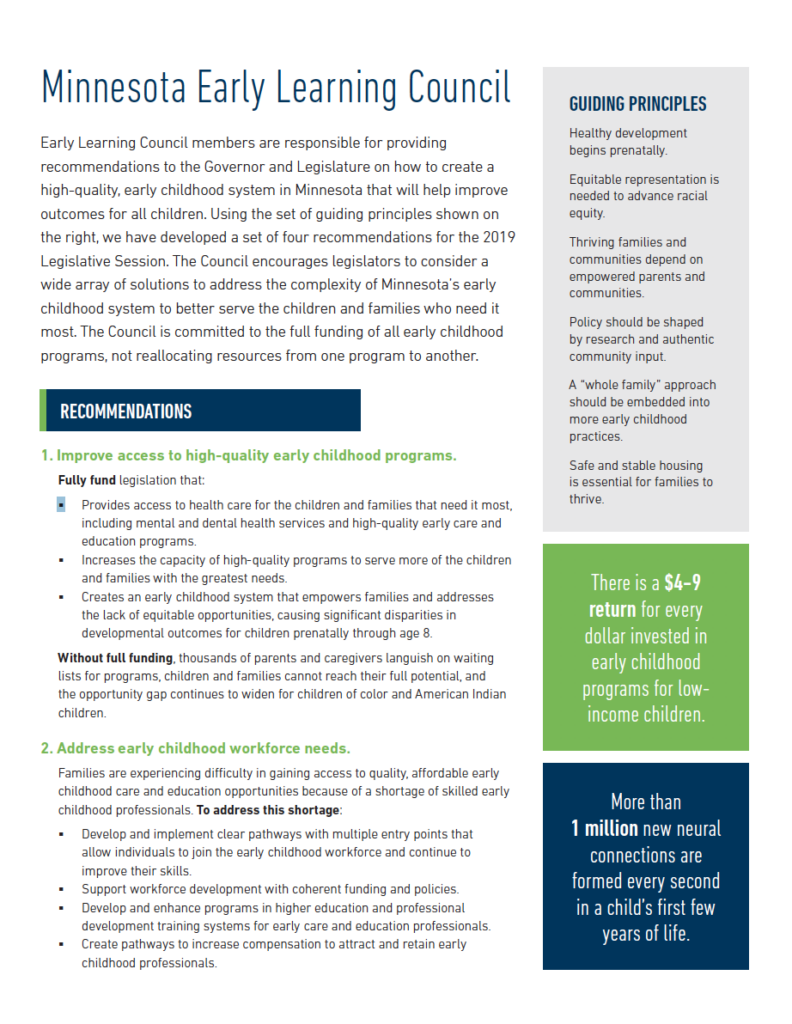Early Learning Council members are responsible for providing recommendations to the Governor and Legislature on how to create a high-quality, early childhood system in Minnesota that will help improve outcomes for all children. Think Small’s Dianne Haulcy is a co-chair of the council.

Members developed a set of four recommendations for the 2019 Legislative Session and they were just submitted to the Governor.
The Council encourages legislators to consider a wide array of solutions to address the complexity of Minnesota’s early childhood system to better serve the children and families who need it most. The Council is committed to the full funding of all early childhood programs, not reallocating resources from one program to another.
1. Improve access to high-quality early childhood programs.
Fully fund legislation that:
- Provides access to health care for the children and families that need it most, including mental and dental health services and high-quality early care and education programs.
- Increases the capacity of high-quality programs to serve more of the children and families with the greatest needs.
- Creates an early childhood system that empowers families and addresses the lack of equitable opportunities, causing significant disparities in developmental outcomes for children prenatally through age 8.
Without full funding, thousands of parents and caregivers languish on waiting lists for programs, children and families cannot reach their full potential, and the opportunity gap continues to widen for children of color and American Indian children.

2. Address early childhood workforce needs.
Families are experiencing difficulty in gaining access to quality, affordable early childhood care and education opportunities because of a shortage of skilled early childhood professionals. To address this shortage:
- Develop and implement clear pathways with multiple entry points that allow individuals to join the early childhood workforce and continue to improve their skills.
- Support workforce development with coherent funding and policies.
- Develop and enhance programs in higher education and professional development training systems for early care and education professionals.
- Create pathways to increase compensation to attract and retain early childhood professionals.
3. Strengthen the early childhood infrastructure.
Minnesota is on the cusp of realizing an early childhood infrastructure that gives our children the best possible start toward a healthy life of learning, achieving and succeeding. There are significant gaps in and a lack of coordinated systems for data collection. It is imperative that we fund innovative pilot programs, strengthen our ability to access meaningful data to evaluate the academic progress of our children, and provide pertinent resources for families and communities so no child “falls through the cracks.”
Fully fund programs that capitalize on successes:
- Help Me Grow — Statewide expansion of Help Me Grow would allow for a more coordinated approach that effectively connects children, families and providers to a broad array of existing support and services with care coordinators to help close the service gap.
- Kindergarten Entry Profile (KEP) — Statewide expansion and adoption of the KEP would allow the Minnesota Department of Education to provide teachers and other educators with assessments that are aligned to Minnesota’s early learning standards that provide a culturally, linguistically, developmentally appropriate — and holistic — view of kindergartners’ strengths and areas of growth. KEP-approved assessments produce data that supports individualized instruction, informs practice and programming, strengthens transitions to kindergarten and guides efforts to close the achievement gaps and improve school readiness.
- Early Childhood Longitudinal Data System (ECLDS) — The ECLDS informs policy and future investments for Minnesota’s early childhood and learning system. As Minnesota continues to make investments, the ECLDS provides information needed to understand the collective impact of the many programs in our state. The ECLDS was built entirely with federal dollars but now needs state funding to continue providing this vital information to key stakeholders and decision-makers.
Minnesota has made significant investments in early care and education programs. The ECLDS shows how children are performing over time after participating in these programs and entering school. Since most Minnesota children and their families participate in multiple programs and services prior to kindergarten entry, the ECLDS helps us better understand how certain combinations of programs support children with various needs.
4. Support funding for a community-led approach to advance Equity.
In order to address the persistent opportunity and achievement gaps between white children and children of color, our state must increase funding and opportunities for children of color and American Indian children beginning prenatally. The Council recommends funding the Community Solutions Fund for Healthy Childhood Development. This fund, proposed to be housed in the Minnesota Department of Health, advances community-led and community-driven initiatives.
To view or print a PDF document of Minnesota Early Learning Council recommendations, including the guiding principles used to determine these recommendations, click HERE.








